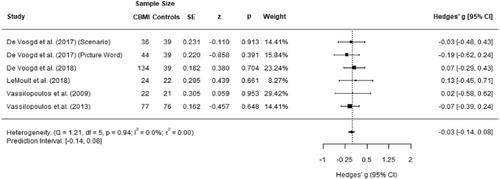Cognitive bias modification of interpretations for anxiety and depression in children and adolescents: A meta-analysis
Abstract
Background
Evidence suggests that cognitive bias modification of interpretations (CBM-I) is effective in modifying interpretation biases and has a small effect on reducing anxiety in children and adolescents. However, most evidence to date is based on studies which report anxiety or general distress using ad-hoc Likert-type or Visual Analogue Scales, which are useful but do not reliably index symptoms of clinical importance. This meta-analysis aimed to establish the effects of CBM-I for children and adolescents on both anxiety and depression using psychometrically validated symptom measures, as well as state negative affect and negative and positive interpretation bias.
Methods
We identified studies through a systematic search. To be eligible for inclusion, studies needed to target interpretation biases, not combine CBM-I with another intervention, randomly allocate participants to CBM-I or a control condition, assess a mental health outcome (i.e., anxiety or depression symptoms using validated measures or state measures of negative affect) and/or interpretation bias and have a mean age less than 18 years.
Results
We identified 36 studies for inclusion in the meta-analysis. CBM-I had a small and non-significant unadjusted effect on anxiety symptoms (g = 0.16), no effect on depression symptoms (g = −0.03), and small and non-significant unadjusted effects on state negative affect both at post-training (g = 0.16) and following a stressor task (g = 0.23). In line with previous findings, CBM-I had moderate to large unadjusted effects on negative and positive interpretations (g = 0.78 and g = 0.52). No significant moderators were identified.
Conclusions
CBM-I is effective at modifying interpretation bias, however there were no effects on mental health outcomes. The substantial variability across studies and paucity of studies using validated symptom measures highlight the need to establish randomized controlled trial protocols that evaluate CBM-I in clinical youth samples to determine its future as a clinical intervention.



 求助内容:
求助内容: 应助结果提醒方式:
应助结果提醒方式:


